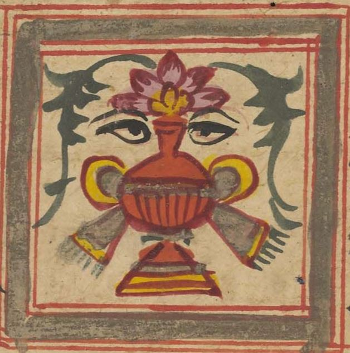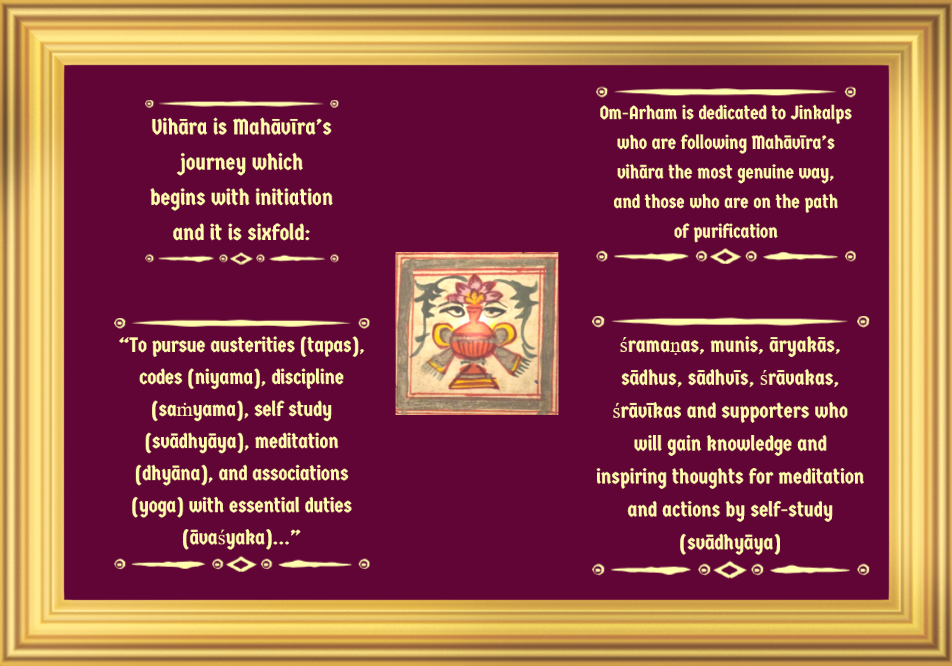About
Om-Arham Jain Foundation

Who we are
"Om-Arham" Foundation is an independent foundation which was established on 18 March 2015 in the sense of Article 87 et seq. Of the Swiss Civil Code. The registered office is in 6716 Acquarossa - Switzerland.
Purpose

Our site is dedicated to the austerity of self-study, which is one of the six divisions of Bhagwaan Mahavira's vihāra which is explained as follows:
The (kind of) student (spiritual aspirant), the object of study and its result, these three must first be known; because nothing can be achieved without collecting the necessary material.
For the kind of student is it given the following 8 classifications:
An aspirant (of the path of purification, here of the division self-study of the teachings of the Jinas) should do right effort, right endeavour and right pursuance to attain eight sthānas (goals):
(1) He should be ever alert to listen to hitherto unknown dharmas (codes of conduct; religious fundamentals).
(2) He should be ever alert to understand the listened dharmas and retain in his memory.
(3) He should be ever alert to block the inflow of new karmas (saṁvara) with the help of ascetic discipline.
(4) He should be ever alert to accomplish purification by shedding karmas (nirjarā) with the help of austerities.
(5) He should be ever alert to organize (to bring them in his organization) the scattered relatives (and co-religionists).
(6) He should be ever alert to impart right knowledge of achar-gochar (ascetic-discipline and alms-collecting) to neo-initiates.
(7) He should be ever alert to serve the ailing ascetics without any feeling of disgust.
(8) When there is a strife among his co-religionists, he should be ever alert to pacify such strife with equanimity and without any demand, expectation or partiality, contemplating as to how those co-religionists may be free of slandering, strife and calling names.
Illustrated Sthānāṅga Sūtra, Padma Prakashan, Delhi 2004, part-2, p. 402, Sthāna 8, verse 111
This is a scale which the self-study student may introspect himself for classify himself.
The object of study is samyagdarśanajñānacāritrāṇi mokṣamārgaḥ 'Right vision, right knowledge and right conduct (together) form the path to liberation'.
The result will be the second of the four things difficult to obtain as given in Uttarādhyayana Sūtra, lecture 3, v. 1
Four things of paramount value are difficult to obtain here by a living being: human birth, instruction in the Law, belief in it, and energy in self-control.
Depending of the purity of an aspirant's righteousness, he may also reach the third and fourth of the four things difficult to obtain...
...or in other words:
Its result is the knowledge of the sages and the application of this knowledge is leading to freedom from the 7 kinds of fear, to freedom from the 11 cardinal doubts and to immortality in a shorter or longer term depending on one’s own efforts, thoughts, words and actions.
Free from the 7 states of fear (Bhīsthāna):
1. ihaloka (fear of same genus),
2. paraloka (fear of other genera),
3. ādāna (fear of thieves, etc.),
4. akasmāt (imaginary),
5. ājīva (fear in regard of livelihood),
6. maraṇa (fear of death),
7. aśloka (fear of censure for misconduct).
Samavāyāṅgasūtra 7
Cf also text and notes 3-5 here
The eleven cardinal doubts are described in 'Saṁvara [part 677]' note 6 here
Vision
- Manifesting of the Jain Religion (Jain Dharma) and the principles of Jainism particularly but not exceptionally, by the actions to be taken with renting or buying of a meeting place and offices, of premises, buying or constructing of buildings as locality which allow the preservation, safekeeping, studying and translation of the canonical and non-canonical scriptures, as well as the practice of the handed down guidelines, particularly of the non-violence and meditation.
- Formation of a Jain sanctuary for animals and human beings with meditation centre.
- Teacher education for Jainism.
- Formation of a Jain university, among others with the compulsory range of the subjects of Sanskrit, Prakrit, Jain-canonical legislation.
- Support for national and foreign archives, libraries, monasteries, universities and schools, etc.
- Researches and publications on Jainism, especially, translations of the canonical and non-canonical Scriptures into the European languages.
- Realization of public discourses on the basic fundamentals of the lore and the Jain-dharma.
- Promotion of an e-library of Jain Scriptures.
- Missionary work in domestic and abroad.
- Supporting of the construction of a Jain Temple with minute adherence to the JAIN architecture for temples.
- Acquisition and use of agricultural land for the cultivation of non-GM crops, vegetables, fruit trees and sacred plants assigned to the 24 prophets without the use of chemical insecticides, pesticides and artificial fertilizers, produced with the utmost consideration of ecology (according to the Jain philosophy) related to protection of animals, plants, soil, water, air).
- The foundation has public benefit nature and pursuits no profit-making purpose at all.